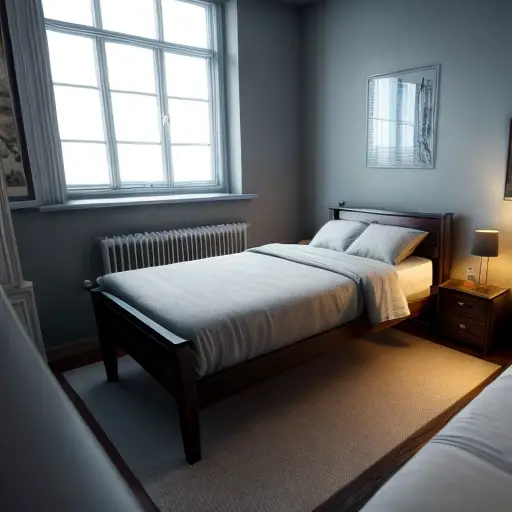Welcome, dear readers, to the wacky world of mental health facilities! Picture this: a place where minds are nurtured, emotions are explored, and sanity is both questioned and restored. These quirky establishments are like a cross between a cozy retreat and a mind-bending amusement park. Mental health facilities are where individuals embark on a journey of self-discovery, guided by a team of compassionate professionals who are part therapist, part magician. These magical places offer a safe haven for those seeking solace from the chaos of their own minds, providing a space where one can unravel the tangled threads of their thoughts and emotions. So, grab your straightjacket and get ready for a rollercoaster ride through the fascinating realm of mental health facilities!
An interesting fact about mental health facilities is that they have evolved significantly over time, transitioning from asylums and institutions to more compassionate and patient-centered environments. In the past, mental health facilities were often characterized by harsh treatments, restraints, and isolation. However, with advancements in understanding mental health and the introduction of human rights movements, these facilities have transformed into therapeutic spaces that prioritize patient well-being, recovery, and community integration. Today, mental health facilities strive to provide a supportive and nurturing environment, offering a range of evidence-based treatments, counseling, group therapy, recreational activities, and holistic approaches to promote mental wellness.
Welcome, fellow adventurers, to the enchanting world of mental health facilities! Prepare to dive deep into the vast ocean of treatment options available in these extraordinary establishments. From the tranquil shores of residential treatment centers to the bustling streets of outpatient clinics, mental health facilities come in all shapes and sizes. Each type offers a unique blend of therapies, medications, and support systems, tailored to meet the diverse needs of individuals battling their inner demons. So, whether you're seeking refuge in a serene wilderness retreat or prefer the convenience of virtual therapy sessions, mental health facilities are here to guide you on your quest towards healing and self-discovery. Get ready to explore the kaleidoscope of treatment options and embark on a transformative journey like no other!

In the realm of mental health, where the battle against invisible foes rages on, mental health facilities stand as beacons of hope and healing. These remarkable establishments play a vital role in promoting recovery and well-being for individuals navigating the treacherous waters of mental illness. With their compassionate staff and evidence-based treatments, mental health facilities provide a safe and nurturing environment where individuals can embark on their journey towards healing.
At the heart of mental health facilities lies a dedicated team of professionals who serve as guides and allies in the battle against mental illness. From psychiatrists and psychologists to therapists and counselors, these unsung heroes offer a listening ear, a comforting presence, and a wealth of knowledge to help individuals navigate the complexities of their minds. Through individual therapy sessions, group support, and various therapeutic modalities, mental health facilities empower individuals to confront their challenges head-on and develop the necessary skills to manage their mental health effectively.
Moreover, mental health facilities serve as a sanctuary, shielding individuals from the stigma and judgment that often accompanies mental illness. In these spaces, individuals can find solace in the knowledge that they are not alone in their struggles. The sense of community fostered within mental health facilities allows individuals to connect with others who share similar experiences, providing a support network that is essential for recovery. Through group therapy, peer support, and shared experiences, individuals can find strength, validation, and encouragement to continue their journey towards well-being.
In addition to providing emotional support, mental health facilities offer a wide range of evidence-based treatments and interventions. From medication management to cognitive-behavioral therapy, these facilities employ a holistic approach to address the multifaceted nature of mental illness. By tailoring treatment plans to meet the unique needs of each individual, mental health facilities empower individuals to take an active role in their recovery journey, fostering a sense of agency and self-empowerment.
In conclusion, mental health facilities serve as invaluable allies in the battle for mental well-being. Through their compassionate staff, supportive communities, and evidence-based treatments, these facilities provide individuals with the tools and resources they need to navigate the labyrinth of mental illness. By promoting recovery, fostering resilience, and offering a safe haven, mental health facilities play a crucial role in helping individuals reclaim their lives and thrive in the face of adversity.
Fun fact: Mental health facilities are not just limited to hospitals or clinics; they can also be found in unique and unconventional settings such as farms, gardens, and even treehouses! These alternative facilities, known as therapeutic landscapes, provide a serene and calming environment for individuals to heal and improve their mental well-being. So, if you ever find yourself seeking mental health support, don't be surprised if you come across a facility nestled amidst nature's beauty!
When it comes to choosing the right mental health facility, one must tread carefully through the maze of options. Effective care hinges on finding a facility that aligns with individual needs and preferences. Factors such as the facility's specialization, treatment approaches, location, and cost must be carefully considered. It is essential to assess the expertise and qualifications of the staff, as well as the availability of comprehensive services. Additionally, the facility's environment and atmosphere should be conducive to healing and comfort. By taking these factors into account, individuals can make an informed decision and embark on a transformative journey towards improved mental well-being.